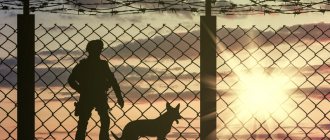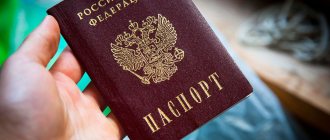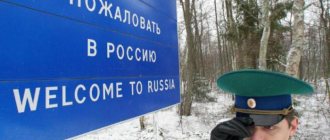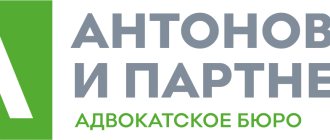Criminal Code of the Russian Federation in the latest edition:
Article 322 of the Criminal Code of the Russian Federation. Illegal crossing of the State border of the Russian Federation
1. Crossing the State Border of the Russian Federation without valid documents for the right to enter or exit the Russian Federation or without proper permission obtained in the manner established by the legislation of the Russian Federation -
shall be punishable by a fine in the amount of up to two hundred thousand rubles, or in the amount of the wages or other income of the convicted person for a period of up to eighteen months, or by forced labor for a term of up to two years, or by imprisonment for the same term.
2. Crossing the State Border of the Russian Federation upon entry into the Russian Federation by a foreign citizen or stateless person whose entry into the Russian Federation is known to be not permitted for the culprit on the grounds provided for by the legislation of the Russian Federation -
shall be punishable by a fine in the amount of up to three hundred thousand rubles, or forced labor for a term of up to four years, or imprisonment for the same term.
3. Acts provided for in parts one or two of this article, committed by a group of persons by prior conspiracy or by an organized group, or with the use of violence or the threat of its use, -
shall be punishable by imprisonment for a term of up to six years.
Note. This article does not apply to cases of foreign citizens and stateless persons arriving in the Russian Federation in violation of the rules for crossing the State Border of the Russian Federation to exercise the right of political asylum in accordance with the Constitution of the Russian Federation, unless the actions of these persons contain another crime.
Return to the table of contents of the document: Criminal Code of the Russian Federation in the latest edition
Entry ban to Russia
Not every person can enter Russian territory. There is a prohibited list for certain categories of people. Entry into Russia may be denied for the following reasons:
- provision of knowingly false information;
- providing false documents;
- have a criminal record;
- did not provide all the documents required to obtain a visa;
- not enough money to live in Russia;
- unwanted stay of this citizen on the territory of Russia;
- debt on taxes or fines unpaid in Russia;
- decision on deportation, expulsion or readmission;
- there is no voluntary health insurance policy (VHI policy);
- the period of temporary stay in Russia in a previous visit to the country was exceeded.
Judicial practice under Article 322 of the Criminal Code of the Russian Federation
Appeal ruling of the Judicial Collegium for Criminal Cases of the Supreme Court of the Russian Federation dated 08/01/2018 N 25-APU18-4
Having disagreed with this court decision, Embergenov E.K. appealed it to the Supreme Court of the Russian Federation, pointing out that he did not evade serving the sentence assigned to him, but was forced to leave for Kazakhstan, since he did not have a job in the Republic of Uzbekistan, and he could not provide for his family, including two young children. He claims that when moving to other countries he always followed the rules for crossing state borders and visa regimes. Expresses doubts about the fairness of his conviction under Part 3 of Art. 322 of the Criminal Code of the Russian Federation. He notes that due to his arrest and detention in the Astrakhan region, his clothes, shoes, construction tools, money, and other things were left unattended in the Republic of Kazakhstan, he does not receive any information about his family, relatives and friends. He declares his desire to return to his homeland, asks to be released from custody and allowed to travel to the Republic of Uzbekistan on his own, and not through the use of extradition measures.
Appeal ruling of the Judicial Collegium for Criminal Cases of the Supreme Court of the Russian Federation dated September 25, 2018 N 5-APU18-50sp
November 22, 2021 under Part 1 of Art. 322, part 3 art. 327 of the Criminal Code of the Russian Federation, in accordance with Part 2 of Art. , art. of the Criminal Code of the Russian Federation to punishment in the form of imprisonment for a period of 1 year 15 days with serving in a high-security correctional colony,
Appeal ruling of the Judicial Collegium for Criminal Cases of the Supreme Court of the Russian Federation dated October 25, 2018 N 23-APU18-6
Krymshamkhalov Yusuf Ibragimovich, ... unconvicted, convicted on January 12, 2004 by the Moscow City Court, taking into account the changes made by the cassation ruling of the Supreme Court of the Russian Federation dated July 8, 2004, under Part 2 of Art. 208; Part 3 Art. 222; Part 3 Art. 223; Part 3 Art. 205; pp. “a”, “c”, “d”, “f”, “g” part 2 art. 105; Part 3 Art. , paragraphs “a”, “c”, “d”, “f”, “g” part 2 of Art. 105; Part 1 Art. , part 3 art. 205; Part 2 Art. 322 of the Criminal Code of the Russian Federation, on the basis of Part 3 of Art. of the Criminal Code of the Russian Federation for a combination of crimes, ultimately to life imprisonment with serving the sentence in a special regime correctional colony,
Appeal ruling of the Judicial Collegium for Criminal Cases of the Supreme Court of the Russian Federation dated December 26, 2018 N 203-APU18-25
- November 20, 2014 under Part 3 of Art. 223, part 3 art. clause "a" part 2 art. 205, part 3 art. 222, paragraph “a”, part 2, art. 205, part 3 art. 222, paragraph “a”, part 2, art. 205, paragraph “a”, part 2, art. 205, part 3 art. 222, paragraph “a”, part 2, art. 205, part 3 art. 222, paragraph “a”, part 2, art. 205, part 3 art. 222, paragraph “a”, part 2, art. 205, part 3 art. 222, paragraph “a”, part 2, art. 205, part 3 art. 222, part 1 art. 222, part 2 art. 327, part 1 art. 322, part 3 art. 327 of the Criminal Code of the Russian Federation; on the basis of Part 3 of Art. of the Criminal Code of the Russian Federation to 13 years in prison with a fine of 50,000 rubles,
Appeal ruling of the Judicial Collegium for Military Personnel Cases of the Supreme Court of the Russian Federation dated October 8, 2019 N 201-APU19-45
sentenced to imprisonment: under Part 3 of Art. 222.1 of the Criminal Code of the Russian Federation for a period of 6 years using Art. Criminal Code of the Russian Federation - no fine; according to Part 3 of Art. 222 of the Criminal Code of the Russian Federation for a period of 5 years; according to Part 2 of Art. 205.4 of the Criminal Code of the Russian Federation for a period of 6 years; according to Part 2 of Art. 205.5 of the Criminal Code of the Russian Federation for a period of 10 years; according to Part 1 of Art. , clause “a”, part 2, art. 205 of the Criminal Code of the Russian Federation for a period of 6 years; according to Part 2 of Art. 322 of the Criminal Code of the Russian Federation for a period of 2 years; according to Art. 205.3 of the Criminal Code of the Russian Federation for a period of 12 years.
Resolution of the Presidium of the Supreme Court of the Russian Federation dated December 5, 2018 N 126P18
Alikhanov was detained on February 3, 2015 in accordance with Art. Art. 91 and 92 of the Code of Criminal Procedure of the Russian Federation on suspicion of committing crimes under Part 4 of Art. 159, part 4 art. 159, part 1 art. 322 of the Criminal Code of the Russian Federation. On February 4, 2015, the judge of the Petrozavodsk City Court of the Republic of Karelia chose a preventive measure against Alikhanov in the form of detention for a period of 2 months, that is, until April 2, 2015 inclusive.
Resolution of the Presidium of the Supreme Court of the Russian Federation dated December 28, 2018 N 296P18pr
Alikhanov was detained on February 3, 2015 in accordance with Art. Art. 91 and 92 of the Code of Criminal Procedure of the Russian Federation on suspicion of committing crimes under Part 4 of Art. 159, part 4 art. 159, part 1 art. 322 of the Criminal Code of the Russian Federation. On February 4, 2015, the judge of the Petrozavodsk City Court of the Republic of Karelia chose a preventive measure against Alikhanov in the form of detention for a period of 2 months, that is, until April 2, 2015 inclusive.
Appeal ruling of the Judicial Collegium for Criminal Cases of the Supreme Court of the Russian Federation dated May 24, 2018 N 5-APU18-19
- according to Part 1 of Art. 322 of the Criminal Code of the Russian Federation, for each of eight crimes, in the form of forced labor for a period of 1 year with the deduction of 10% of wages to the state. Based on Part 3 of Art. The Criminal Code of the Russian Federation, based on the totality of crimes by partial addition of punishments, finally imposed 17 years of imprisonment to be served in a high-security correctional colony.
Appeal ruling of the Judicial Collegium for Military Personnel of the Supreme Court of the Russian Federation dated September 12, 2017 N 209-APU17-2
sentenced to imprisonment under paragraphs “a”, “g”, part 2 of Art. 105 of the Criminal Code of the Russian Federation for a period of 17 years; according to paragraphs “a”, “b”, “c”, part 2 of Art. 158 of the Criminal Code for a period of 2 years; according to Part 1 of Art. 158 of the Criminal Code of the Russian Federation to a fine of 30,000 rubles; according to Part 3 of Art. , part 3 art. 322 of the Criminal Code of the Russian Federation to imprisonment for a term of 2 years.
Appeal ruling of the Judicial Collegium for Criminal Cases of the Supreme Court of the Russian Federation dated October 27, 2017 N 72-APU17-23sp
- during the trial, the requirements of Part 2 of Art. 345 of the Code of Criminal Procedure of the Russian Federation, which provides that if the jury’s verdict is unclear or contradictory, the presiding judge is obliged to point out these circumstances to the jurors and invite them to clarify the verdict in the deliberation room. At the same time, the state prosecutor draws attention to the jurors' answers to questions No. 2-a (in relation to Borisenko) and No. 2-b (in relation to Banshchikov) contained in the verdict, considering them contradictory and unclear. The cumbersome design of question No. 27, according to the prosecutor, was difficult for the jurors to understand and did not allow them to understand the essence of the issue. At the same time, according to the state prosecutor, in the first copy of the question sheet issued to the jurors, the jurors, when answering question No. 27, indicated that Borisenko’s actions in organizing a close-knit group for the illegal alienation of apartments were proven and that the organization of Sh’s murder was not proven. After the presiding officer’s explanations about integrity of this issue, the jurors responded that Borisenko’s actions were not proven. The state prosecutor draws attention to another verdict of the Trans-Baikal Regional Court dated December 3, 2014, which entered into legal force, according to which Borisenko N.N. found guilty of creating an organized group for the purpose of committing grave and especially grave crimes and obtaining a permanent source of income, as well as committing a number of crimes as part of an organized group under Articles 105, 159, 291, 322, 327, 330 of the Criminal Code of the Russian Federation. The contradictions in the question paper, according to the prosecutor, resulted in an illegal verdict against Borisenko, Nozdrin, Banshchikov, Kolobov, Fedoreev and Volkov, an unfounded acquittal of Borisenko, Banshchikov and the imposition of an excessively lenient sentence for Borisenko;
Appeal ruling of the Judicial Collegium for Criminal Cases of the Supreme Court of the Russian Federation dated May 14, 2019 N 4-APU19-8
according to Part 1 of Art. 322 of the Criminal Code of the Russian Federation (for each of 6 crimes) for 1 year with exemption from punishment due to the expiration of the statute of limitations for criminal prosecution; according to Part 1 of Art. 210 of the Criminal Code of the Russian Federation for 18 years;
Crossing the border with a visa
Citizens of countries with which Russia does not have visa-free agreements are required to apply for a visa to travel to Russia. Visas can be:
- tourist;
- business;
- working;
- educational;
- guest;
- transit.
To obtain a tourist visa, you need a tourist invitation to visit Russia for tourism purposes. The maximum period of stay is 30 days. To obtain a business visa, you need a business invitation, which is issued through the Federal Migration Service and the Ministry of Foreign Affairs of the Russian Federation. The periods for which a business visa is issued are 30, 90, 180, 365 days. To obtain a work visa you need a work invitation. She has no restrictions on her stay. A study visa is issued on the basis of an invitation to study at an educational institution. A guest visa is issued on the basis of a private invitation at the request of a Russian citizen who has permanent residence in Russia. The maximum period of stay is 3 months. Finally, a transit visa is issued on the basis of documents submitted to the Russian Consulate for transit purposes. The maximum stay is 72 hours.





